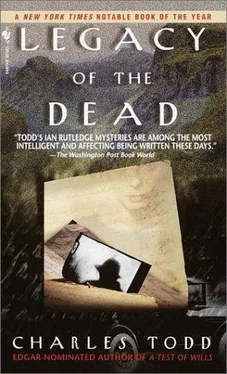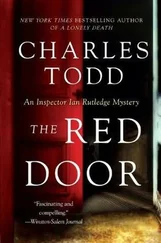Charles Todd - Legacy of the Dead
Здесь есть возможность читать онлайн «Charles Todd - Legacy of the Dead» весь текст электронной книги совершенно бесплатно (целиком полную версию без сокращений). В некоторых случаях можно слушать аудио, скачать через торрент в формате fb2 и присутствует краткое содержание. Жанр: Полицейский детектив, на английском языке. Описание произведения, (предисловие) а так же отзывы посетителей доступны на портале библиотеки ЛибКат.
- Название:Legacy of the Dead
- Автор:
- Жанр:
- Год:неизвестен
- ISBN:нет данных
- Рейтинг книги:5 / 5. Голосов: 1
-
Избранное:Добавить в избранное
- Отзывы:
-
Ваша оценка:
- 100
- 1
- 2
- 3
- 4
- 5
Legacy of the Dead: краткое содержание, описание и аннотация
Предлагаем к чтению аннотацию, описание, краткое содержание или предисловие (зависит от того, что написал сам автор книги «Legacy of the Dead»). Если вы не нашли необходимую информацию о книге — напишите в комментариях, мы постараемся отыскать её.
Legacy of the Dead — читать онлайн бесплатно полную книгу (весь текст) целиком
Ниже представлен текст книги, разбитый по страницам. Система сохранения места последней прочитанной страницы, позволяет с удобством читать онлайн бесплатно книгу «Legacy of the Dead», без необходимости каждый раз заново искать на чём Вы остановились. Поставьте закладку, и сможете в любой момент перейти на страницу, на которой закончили чтение.
Интервал:
Закладка:
“Then that’s where the secret lies. The one you have to dig out.”
He had left Mrs. Cook out of the story. He said, “Before I can find the father, I have to find the mother. And before I can be sure I’ve found her, I must track down Eleanor Gray.”
“Then walk carefully. I don’t have a good feeling about this, Ian. Walk carefully!”
In the morning, Rutledge left to drive north to the Trossachs. Sir Walter Scott had used the district’s great beauty for the setting of his poem Lady of the Lake, and again in the novel Rob Roy. Whether Rob Roy MacGregor was a bandit or a Scottish Robin Hood depended on who was telling the story. But between them, he and Scott had made that stretch of lochs and hills famous. Even the Wordsworths, William and his sister Dorothy, had walked there.
Rutledge spent most of his second day searching for a Robert Burns. Ordinarily, he’d have asked the fiscal for his son’s direction, but he wanted to avoid any interference with the neighbor, Mrs. Raeburn, before he got to her.
He didn’t distrust the fiscal; he thought the man was probably honest and by his own lights dependable. But when it came to family secrets, even the most honest of men fiercely protected their own.
On the third morning, he found what he was looking for. Driving into a ring of spectacular barren hills, he reached a town called Craigness. It lay in a tree-rimmed bowl, east of where two rivers joined and a bridge wide enough to take motorcars crossed them. Its tall, slender church tower gleaming in the morning mists, and its houses looking far more English Georgian than Scottish, gave it an oddly graceful air, but north of it spread out the Highlands. Here Rutledge located the law office of Burns, Grant, Grant, and Fraser. It was an old building in a line of old buildings, with a first-floor bay window that jutted into the street. The brass handles and doorknob shone with polish against the dark red door.
“With prices to match the furnishings,” Hamish commented as Rutledge opened the outer door to the smell of beeswax, good leather, and better cigars. An aura of respectability, timelessness, and good taste hung in the air.
Neither Mr. Grant Senior nor Mr. Grant Junior was in, he was informed by a young clerk. But Mr. Fraser would see him.
Rutledge walked into a paneled room filled with books, floor-to-ceiling shelves, volume after volume spilling over onto chairs and tables and every other flat surface, even jostling for space on the windowsills and cluttering the beautiful old carpet on the floor.
The man behind the desk rose to greet him, offering his left hand. His right arm was missing. “Inspector Rutledge! I’m Hugh Fraser. I hope there’s a grisly murder under our noses. I’m sick to death of wills and deeds and title disputes.” The fair face beamed at him, but the blue eyes were sharp.
“No such luck. I understand from the local police that one of your partners was a Robert Burns.”
“Yes, Robbie died in France in 1916. We’ve left his name on the door out of respect. Although I must say, I would welcome his ghost as a partner to help me sort out this tangle.” Fraser waved his left hand at the chaos.
No, you wouldn’t, Rutledge silently replied. Aloud, he said, “Do you know when he was killed?”
“In the spring of 1916.” He gave Rutledge the date. It was the same week Eleanor Gray had told Mrs. Atwood that she was going north to Scotland. “I heard it almost at once, actually. From a supply sergeant I was dealing with. He wasn’t aware that Robbie was my law partner. He just said he’d been told one of the Trossachs men had bought it that morning and thought I might know him. Hell of a way to find out. Robbie was a good man.” The smile had faded. “We lost too many good men. Were you out there?”
“On the Somme,” Rutledge answered, his voice cold enough to ward off friendly reminiscences.
Fraser nodded. “That was the worst of a bad lot. Why is the Yard interested in Robbie? Is it to do with any of his personal affairs? We handled everything. The will was straightforward, as you’d expect. I can’t imagine that three years later it might interest the police.”
“Not the will, no. I’m looking for the property that Captain Burns owned here. A house, I think.”
“His father hasn’t sold it. As I remember, it was a family property and Mr. Burns Senior was not prepared to part with it. He hasn’t changed his mind, has he?”
“Not to my knowledge. During the war, did Captain Burns’s friends use the house from time to time?” If Burns was killed the week she came north, he hadn’t driven Eleanor Gray to Scotland. Someone else had.
“I have no idea. I wouldn’t be surprised. Robbie was a generous man; he often did such things. You’ll have to speak to Robbie’s father. But I can tell you how to find the house. Craigness is small. You’ll have no trouble.”
“There was a young woman Captain Burns met in London whilst on sick leave. Eleanor Gray. Did he ever speak of her to you?”
“Eleanor? Oh, yes. Often. Robbie had helped her find pipers to entertain the wounded. Quite an undertaking, that was. He sent me a witty account of it, and it reached me in the middle of a push. It was a bad time, and the laugh did me good. At any rate, he and Eleanor went on to spend a good deal of time together before he was sent back to France. Showed me her photograph, in fact, when we crossed paths the last time. I got the feeling it was fairly serious. Robbie had enormous charm, you know, people liked him. A pity he didn’t make it home. I tried to look up Eleanor after the war, but no one had any idea where she might be. I wanted her to know how much he cared.”
Would it have made a difference if she’d known that in 1916? Aloud, Rutledge said, “Have you kept any of his letters?”
“Regrettably, no. I needn’t tell you how it was in the trenches. Paper was the first to rot in the rain and the mud-nothing lasted very long, not even boots. And what the weather didn’t get, the rats did. Stinking bastards!” It was said unemotionally. The rats had become so fierce and so common that not even a heavy shelling rid the trenches of them. You got used to them.
Rutledge nodded. “If you can tell me how to find the house, I’ll be on my way.”
“I’ll do that if you’ll come and have lunch with me. My wife’s in Edinburgh for the week, and I’m damned tired of my own company!”
The house stood in a street of houses that had well-kept gardens and a remarkable view of the hills. Two nursemaids with prams passed him as he stepped out of the car, deep in earnest conversation while their charges slept. Rutledge studied number fourteen for a time, then went to the door of number fifteen. But no one appeared to be at home. He tried number thirteen, and an elderly woman opened the door, peering at him over the top of her spectacles, the silver chain attached to them almost the same color as her hair.
“Yes?” She looked him up and down. “If you’re here to see Barbara, I’m afraid she’s out.”
“Inspector Rutledge, Scotland Yard,” he told her. “Can you give me a few minutes of your time? I’m interested in the Burns house. At number fourteen.”
“Inspector, are you? Why should anyone in London care about the Burns house? It hasn’t been lived in since poor Robbie’s death.”
“Yes, that’s what I’m told. He died in France. Do you remember when?”
“In the spring of 1916!” she retorted as if he had doubted her mental alertness. “It’s my legs that are giving out, young man, not my brain!”
“I meant no offense, Mrs.-”
“The auld biddy-” Hamish interjected.
“Raeburn. Robbie used to tease me about that. Burns and Raeburn, he said. A better name for a law firm than Burns, Grant, Grant, and Fraser.” She stepped back. “Do come in! I can’t stand here the morning long.”
Читать дальшеИнтервал:
Закладка:
Похожие книги на «Legacy of the Dead»
Представляем Вашему вниманию похожие книги на «Legacy of the Dead» списком для выбора. Мы отобрали схожую по названию и смыслу литературу в надежде предоставить читателям больше вариантов отыскать новые, интересные, ещё непрочитанные произведения.
Обсуждение, отзывы о книге «Legacy of the Dead» и просто собственные мнения читателей. Оставьте ваши комментарии, напишите, что Вы думаете о произведении, его смысле или главных героях. Укажите что конкретно понравилось, а что нет, и почему Вы так считаете.












